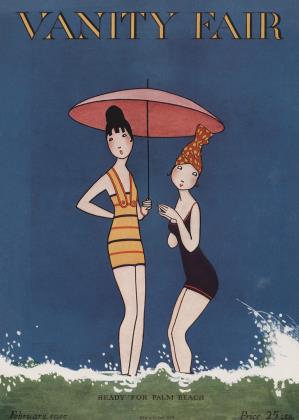Sign In to Your Account
Subscribers have complete access to the archive.
Sign In Not a Subscriber?Join NowLEO DITRICHSTEIN: ACTOR AND PLAYWRIGHT
James L. Ford
A Word on His Career and Art,
WHEN success and Leo Ditrichstein clasped hands across the footlights of the Belasco Theatre on the first night of "The Phantom Rival," they met, not as strangers, but as friends of long standing. Indeed, no player who has come to us from the German stage has taken a firmer hold on the American public than he.
A Hungarian by birth, and of a family that had no affiliation with the theatre, he was attracted to the stage from his earliest childhood and while still in his teens ran away from home and joined a traveling circus. His next move was from the sawdust to the legitimate stage. He had a splendid training in the art of acting as practiced in the incomparable theatres of Vienna, where he soon attracted the attention of Gustav Amberg. It was at the instance of the latter that young Ditrichstein came to New York as a member of the German company, maintained in what is now the Irving Place Theatre. Few players remain long in Irving Place. Many return to Germany, and a few seek engagements on the English-speaking stage. Ditrichstein enrolled himself with this minority.
His first great success was as Zuzu in Paul Potter's version of "Trilby." On the initial representation of that piece he established himself firmly in the esteem of the cognoscenti as a comedian equipped with strictly legitimate methods. For many years Ditrichstein acted, adapted, and wrote plays, in many cases collaborating with the late Clyde Fitch, but more frequently working alone. He tried his hand at farce, melodrama and comedy, and from every one of his varied experiences he contrived to learn something. His speech on the first night of "The Phantom Rival," in which he gracefully acknowledged his indebtedness to David Belasco, showed him to be devoid of that curious, but by no means rare form of histrionic vanity, the hall-mark of which is an expressed contempt for any sort of instruction.
But it was in "The Concert" that he was seen at his best in his dual capacity of adapter and actor. That his performance was one of remarkable merit is amply proved, not only by the success of the piece in this country, but also by its failure in London with anotherplayer—and a very good one, too—in the leading role.
Mr. Ditrichstein owes his success as an actor to many causes; too many, in fact, to be enumerated here. One quality in his work, however, deserves special mention, because of its rarity on our stage. He knows the difference between mere realism and true art; between imitating and acting. It was this in "The Concert" that enabled him to overcome the prejudices of the women in the audience, by convincing them that much should be forgiven in "a man of temperament."
 View Full Issue
View Full Issue












Subscribers have complete access to the archive.
Sign In Not a Subscriber?Join Now